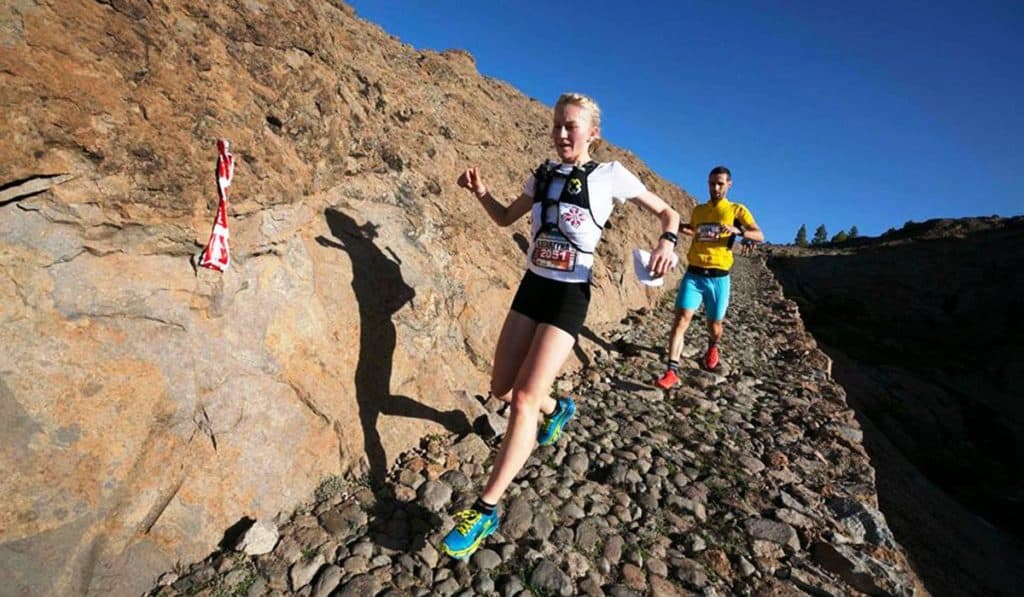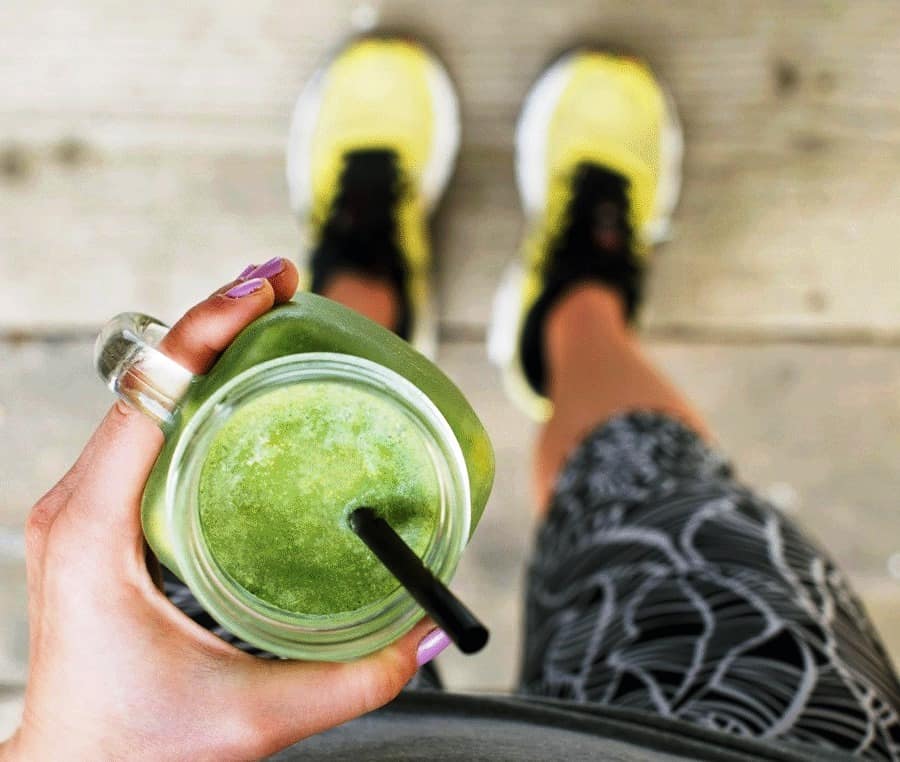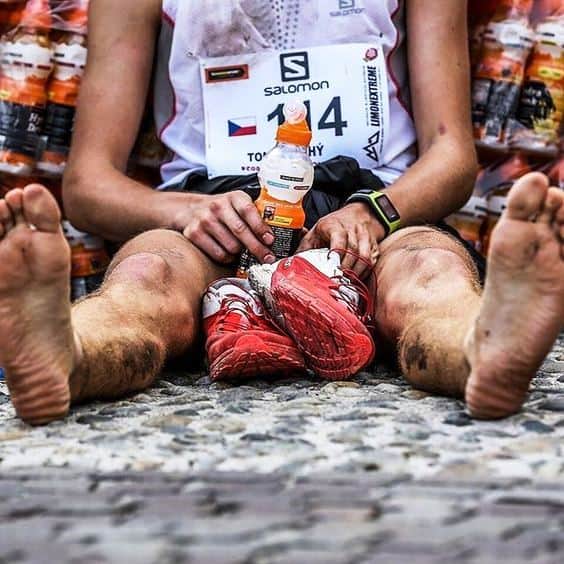
One of the advantages of our local trails for long runs is that most are wide enough to run alongside friends and chat. That keeps your pace slow enough to be below your aerobic threshold.
That is exactly what happened this past Sunday when Valentina and I were doing our 150-minute run. It wasn’t long before our discussion ventured down the path of athlete diet. Valentina expressed that she tried to avoid protein as she didn’t want to bulk up and look too manly like a bodybuilder. We decided that a little investigation was in order.
How much protein do trail runners need? Trail runners that run distances up to 10km will need 0.81g of protein per pound of body weight for race day and big workouts. However, this number increases to 1.26g of protein per day for ultra runners training for a 100-mile ultra.
Why Do Trail Runners Even Need Protein?
During the process of trail running as an activity, your muscles break down. Consequently, they will need to be built back up again so that they can cope with your next training run. Protein is the basic building block that your body will use for the rebuild and repair process.
If your nutrition does not have enough protein you are just compromising your ability to recover.
You may not notice the difference in your very next run out on the trails. However, if you keep your protein intake too low for too long your muscles will get progressively weaker and weaker. Do this for long enough and you are almost certainly heading down the path of guaranteed injury.
Remember that your protein intake does not exist in isolation within your nutrition strategy. If you fail to take on sufficient calories after exercise to replenish energy levels your body will break down the protein that you eat for energy purposes leaving you with insufficient protein for muscle repair.
Myth: Protein Makes You Bulky
This is a statement that I hear from many trail runners, especially from female trail runners. If your goal is to become bulky you need to combine four factors together. Simply increasing your protein intake may not even be enough to meet one of those four factors.
Those factors are as follows:
- Calorific surplus: You need to consume more calories than you burn in order to bulk up. If you do not do that bulking cannot occur. During the bulking phase, you will bulk up both muscle and fat. You then follow with a program to “cut” away the fat to leave the bulked muscle physique.
- Protein predominant nutrition: Within your calorie surplus you need to ensure that your protein intake is the predominant macronutrient within your nutrition plan. Bodybuilders aim for a ratio of 50% protein, 35% carbohydrates, and 15% fat.
- Testosterone: You may have control about the nutrition and nutrient ratios of the food that goes into your mouth and down your throat. Once you have swallowed it is your hormones that determine how and where that nutrition is applied within your body. Testosterone tells the protein to go build muscle. More testosterone equals more muscle, hence the popularity of anabolics.
- Lift very heavy weights in the gym: This last part is key for bulking up. You need to lift very heavy weights in the gym, to the point of muscle failure. When you do this you signal your body that your muscles need to be bigger and stronger to cope with the seemingly impossible workload.

Myth: Female Endurance Athletes Need Less Protein
It took me a while to puzzle out why or how this myth could have come to be believed. Then it struck me. Generally, on average, female endurance athletes tend to be lighter than male endurance athletes. We could debate at length as to why, but that would digress from the matter at hand.
Optimal protein intake is measured as grams of protein per pound of body weight per day. If the athlete is heavier they will need more protein irrespective of gender.
Based on the generalization of male endurance athletes being heavier, that in turn fueled the myth of female endurance athletes needing more protein.
In fact, sports nutritionists recommend that pregnant or nursing female endurance athletes need to increase their daily protein intake by between 30% and 50% for the health and, well being of their baby.
What Is Complete Protein And Do You Need It?
Before getting into what a “complete protein” is, we should take a closer look at what makes up a “protein”.
There are potentially up to 20 different amino acids that can be grouped together to form what we know as protein. Of those, nine have been classified as essential amino acids.
Complete proteins are those that contain all nine of the essential amino acids. Having all nine essential amino acids within a single food is great, however, that does not mean that those nine essential amino acids are in the ratio that your body needs for optimum recovery and muscle regeneration.
The following foods are classified as complete proteins, though all are different in terms of amino acid ratios: Quinoa, Soy Beans, Dairy Products, Eggs, Fish, Poultry, and Red Meat.
That leads to the question of how we get our protein in the precise ratio of amino acids that our body needs for muscle regeneration.
Our digestive process breaks down the protein we eat into the component amino acids. Our body is then able to combine amino acids together into new protein molecules in the ratio that we need.
Therefore, as long as you consume enough nutrition containing a variety of different protein sources you will not only ensure that you get the nine essential amino acids that constitute “whole protein,” but you will be getting the other eleven less essential amino acids as well.

Be Aware Of Your Base Metabolic Rate
It is interesting that nowhere have I seen anything referencing base metabolic rate in an article on the protein needs of an athlete. It is well known that you can metabolize protein for fueling your body. That is either from your nutrition or digesting muscle tissue.
While metabolizing protein for energy is not an efficient process, it is a way for your body to cope with drastic caloric deficits. I speak for myself when I say that most of us carry a “bit” of excess fat storage that our body can access for fuel. This means that in theory, we should be able to access this extra fat instead of burning protein.
However, seasoned athletes don’t have the same volume of stored fat as the rest of us do. One prime example was a friend that was staying with us last week. He has a Basal Metabolic Rate of 3600Cal per day. Add to that he was doing 4+ hour long bike rides on his training camp. Those bike rides burned an additional 2500Cal a day or more.
In his case his nutrition needed to match his output otherwise he would not be able to use protein for muscle regeneration even if he consumed almost only protein.
Even if you do have fat reserves that you can tap into for energy, don’t fall into the trap of maintaining a massive calorie deficit. If you do that you will run into problems with your Leptin levels. The levels of the hormone Leptin in your body are closely correlated to fluctuations in your body fat percentage.
When you go into the type of massive Calorie deficit that requires you to tap deep into your fat reserves you will also lower your Leptin levels. When your Leptin levels drop it triggers the reaction in your brain that makes you ravenously hungry.
I can certainly remember the times, and I am sure that you can too when you come back from a five-hour bike ride or three-hour run and demolish everything in the fridge and pantry. It was only years later that I learned that this was my lowered Leptin at work.
The bummer about Leptin is that once your Leptin-induced ravenous hunger is triggered it will not dissipate until your body has restored the burned off body fat. What’s more, any protein you eat will primarily go to restoring your missing fat reserves rather than the recovery that you need it for.
As a side note, that is why the most effective long term weight loss programs maintain a Calorie deficit of less than 100Calories per day but maintained over an extended time period. More than that and you risk triggering Leptin-induced hunger that will force you to eat until you recoup all the fat back again plus extra. Classic yo-yo dieting.

Athletes Never Diet And Exercise
As a trail runner, it is vital that you do not get suckered into the trap of a diet and exercise mindset. It is a mindset promoted by those trying to cash in on the evergreen “crash diet” market.
When you combine severe Calorie-restricted dieting with exercise the result is a drastic reduction in your body fat percentage. That is why it is popular with people looking to lose a lot of weight very quickly for a specific event, usually of a social nature.
If you attempt to Calorie restrict as a trail runner you also compromise your immune system. Getting ill is an effective way for your body to get you to stop training so that your fat reserves can get built back up.
As I mentioned earlier the resulting drop in your Leptin levels will just about force food down your throat the moment your targeted social event has passed. Diet product marketers then blame you for a lack of willpower so they can sell you the next crash diet product.
Your best option as a trail runner will be to ensure that your nutrition is sufficient to fuel your workouts and your recovery. In order to keep the Leptin monster at bay, try and keep your daily calorie deficit to within 300Cal. That way even a big training or race day will still keep you within your long term target.
Eating enough to fuel your training an recovery will allow you to keep consistency in your trail running. That is a strategy that will benefit your health and fitness over the long term.
Best Time Of Day For Protein Intake
The absolute best time of day for the biggest portion of your protein intake will depend on your preferred time of day to train.
It is vital that you have a protein-rich meal within three hours of completing a hard workout or race to maximize your recovery.
Another great time of day for a protein-rich meal will be two to three hours before sleep. The reason for this is that you do the most muscle rebuild while you sleep. However, don’t make your pre-sleep meal too big or too heavy or indigestion may prevent you from getting your much-needed sleep.
Aside from these two key areas, it is always a good idea to include protein in all your meals as a way to balance your macronutrient ratios.

Protein Requirements Across Different Trail Run Distances
As you can imagine, different trail run distances place completely different nutrition demands on your body in terms of Calorie needs. Not only this but training yourself up to these distances requires more in terms of overall nutrition volume as well as protein needed for proper recovery.
- Zero Running (Base Metabolism): 0.36g of protein per pound of body weight (0.8g of protein per kilogram of body weight) per day.
- Up To 10k Trail Runs, 0.81g of protein per pound of body weight (1.8g of protein per kilogram of body weight) per day.
- Half Marathon Trail Runs, 0.99g of protein per pound of body weight (2.2g of protein per kilogram of body weight) per day.
- Marathon Trail Runs, 1.13g of protein per pound of body weight (2.5g of protein per kilogram of body weight) per day.
- 50 Mile Trail Runs, 1.17g of protein per pound of body weight (2.6g of protein per kilogram of body weight) per day.
- 100 Mile Trail Runs, 1.26g of protein per pound of body weight (2.8g of protein per kilogram of body weight) per day.
Make sure that your protein intake is part of a balanced nutrition strategy. I see many websites repeating the age-old theory of maintaining your Carbohydrate/Protein/Fat macronutrient ratios consistently. In reality, for long distance trail runners, your macronutrient ratios will fluctuate based on your training needs.
Sport science these days looks more to absolute values for Protein and carbohydrate consumption. You base your protein intake on what you need to best recover from the workout you have just done. Conversely, you base your carbohydrate intake on what you need to fuel your next workout. You then balance up to your calorie needs for any specific day using fat.
The following list is the indicated carbohydrate values for fueling various distance trail runs.
- Training volume of 1 hour per day requires 2.27g of Carbohydrate per pound (5g per kilogram) of body weight per day.
- Training volume of 2 hours per day requires 2.72g of Carbohydrate per pound (6g per kilogram) of body weight per day.
- Training volume of 3 hours per day requires 3.17g of Carbohydrate per pound (7g per kilogram) of body weight per day.
- Training volume of 4 hours per day requires 3.63g of Carbohydrate per pound (8g per kilogram) of body weight per day.
- Training volume of 5 hours per day requires 4.08g of Carbohydrate per pound (9g per kilogram) of body weight per day.
- Training volume of more than 5 hours per day requires 4.54g of Carbohydrate per pound (10g per kilogram) of body weight per day.
It must be noted that these nutritional requirements are based upon what is needed to fuel your training and recover from your training. Pregnant and nursing mothers need to factor in additional nutrition based on the needs of their infant.
12 Foods With The Most Protein per Ounce (Gram)
Let’s have a closer look at the foods that will get the most protein on your plate for the smallest portion possible. In other words which foods have the highest amount of protein per ounce.
For the sake of comparison serving sizes in this list have been equalized to 3.5oz (100g). That way you can see which foods have the highest protein density by weight.
- Spirulina contains 57.5g of protein in each 3.5oz (100g).
- Dry Roasted Soybeans contains 43.3g of protein in each 3.5oz (100g).
- Grated Parmesan Cheese contains 41.6g of protein in each 3.5oz (100g).
- Lean Veal Top Round contains 36.7g of protein in each 3.5oz (100g).
- Lamb Shoulder Roast contains 35.5g of protein in each 3.5oz (100g).
- Lean Chicken contains 32.1g of protein in each 3.5oz (100g).
- Non-fat Mozzarella contains 31.7g of protein in each 3.5oz (100g).
- Pork Chops contains 31g of protein in each 3.5oz (100g).
- Tuna contains 29.9g of protein in each 3.5oz (100g).
- Squash and Pumpkin Seeds contain 29.8g of protein in each 3.5oz (100g).
Here are a couple of other foods known for their protein content for comparison.
- Beef contains 28.4g of protein in each 3.5oz (100g).
- Eggs contain 11.3g of protein in each 3.5oz (100g).
- Lentils contain 9g of protein in each 3.5oz (100g).
- Low Fat Yoghurt contains 5.7g of protein in each 3.5oz (100g).
10 Foods With The Most Protein Per Calorie
You will have noticed that the above table shows foods that are relatively calorie dense, in other words, besides having lots of protein, each ounce of that food has a high total calorie count. Instead, let’s look to the foods that have the most protein per calorie.
You will notice that this list contains foods that are less calorie dense and hence more easily digestible, making them ideal choices for things to eat before you go to bed.
- Tuna has 91% of calories as protein.
- Spirulina has 78% of calories as protein.
- Skinless Chicken breast has 77% of calories as protein.
- Greek Yogurt has 73% of calories as protein.
- Pork has 73% of calories as protein.
- Skinless Turkey breast has 70% of calories as protein.
- Beef has 53% of calories as protein.
- Watercress has 52% of calories as protein.
- Sardines have 50% of calories as protein.
- Spinach has 49% of calories as protein.
Here are a couple of other foods known for their protein content for comparison.
- Salmon has 46% of calories as protein.
- Broccoli has 45% of calories as protein.
- Kale has 45% of calories as protein.
- Mackerel has 39% of calories as protein.
- Lamb has 37% of calories as protein.
- Eggs have 35% of calories as protein.
- Lentils have 27% of calories as protein.
- Black Beans have 23% of calories as protein.
- Whole Milk has 21% of calories as protein.
- Chickpeas have 19% of calories as protein.
- Almond nuts have 13% of calories as protein.
Related Questions
Do trail runners need extra protein? Several studies into the protein needs of athletes show that trail runners need protein to facilitate the recovery process after each workout. Omitting extra protein from your nutrition will seriously impede your ability to recover.
Do long distance trail runners need protein? According to the American College of Sports Medicine the longer the distance of your trail run the more protein you need as part of your nutrition plan to enable you to adequately recover from your run.
